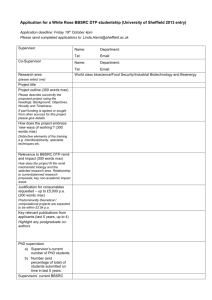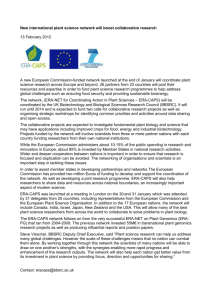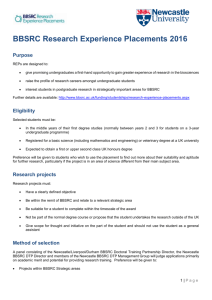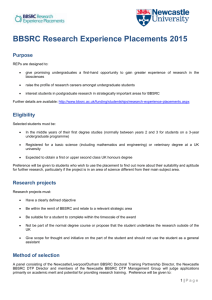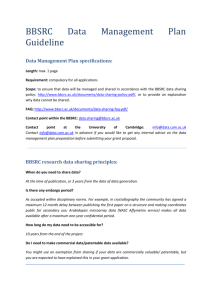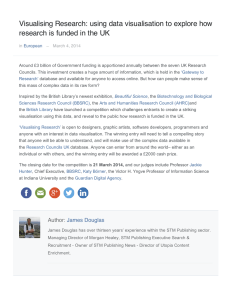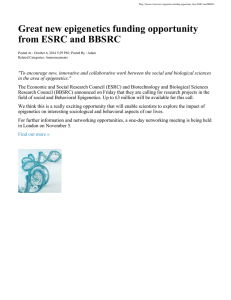You can download the successful BBSRC DNA anniversary application by Steve Harding, Mark Jobling and Judith Jesch
advertisement
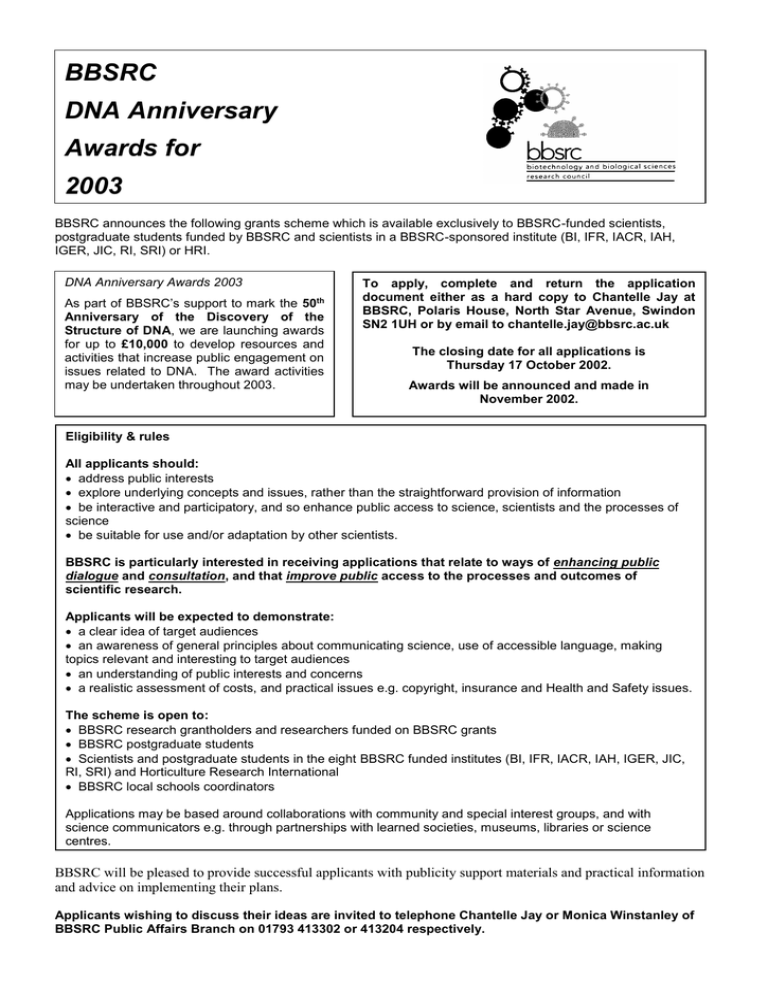
BBSRC DNA Anniversary Awards for 2003 BBSRC announces the following grants scheme which is available exclusively to BBSRC-funded scientists, postgraduate students funded by BBSRC and scientists in a BBSRC-sponsored institute (BI, IFR, IACR, IAH, IGER, JIC, RI, SRI) or HRI. DNA Anniversary Awards 2003 As part of BBSRC’s support to mark the 50th Anniversary of the Discovery of the Structure of DNA, we are launching awards for up to £10,000 to develop resources and activities that increase public engagement on issues related to DNA. The award activities may be undertaken throughout 2003. To apply, complete and return the application document either as a hard copy to Chantelle Jay at BBSRC, Polaris House, North Star Avenue, Swindon SN2 1UH or by email to chantelle.jay@bbsrc.ac.uk The closing date for all applications is Thursday 17 October 2002. Awards will be announced and made in November 2002. Eligibility & rules All applicants should: address public interests explore underlying concepts and issues, rather than the straightforward provision of information be interactive and participatory, and so enhance public access to science, scientists and the processes of science be suitable for use and/or adaptation by other scientists. BBSRC is particularly interested in receiving applications that relate to ways of enhancing public dialogue and consultation, and that improve public access to the processes and outcomes of scientific research. Applicants will be expected to demonstrate: a clear idea of target audiences an awareness of general principles about communicating science, use of accessible language, making topics relevant and interesting to target audiences an understanding of public interests and concerns a realistic assessment of costs, and practical issues e.g. copyright, insurance and Health and Safety issues. The scheme is open to: BBSRC research grantholders and researchers funded on BBSRC grants BBSRC postgraduate students Scientists and postgraduate students in the eight BBSRC funded institutes (BI, IFR, IACR, IAH, IGER, JIC, RI, SRI) and Horticulture Research International BBSRC local schools coordinators Applications may be based around collaborations with community and special interest groups, and with science communicators e.g. through partnerships with learned societies, museums, libraries or science centres. BBSRC will be pleased to provide successful applicants with publicity support materials and practical information and advice on implementing their plans. Applicants wishing to discuss their ideas are invited to telephone Chantelle Jay or Monica Winstanley of BBSRC Public Affairs Branch on 01793 413302 or 413204 respectively. APPLICATION Office use only. Application Number: for a BBSRC DNA Anniversary Award to enhance public access to science. Please tick as appropriate I am a BBSRC grantholder/funded on a BBSRC grant Research Grant number: 00/A2/E/06357 I am a BBSRC research student I work in one of the eight BBSRC-sponsored institutes (BI, IFR, IACR, IAH, IGER, JIC, RI, SRI) or HRI I am an official BBSRC local schools coordinator Name Professor Stephen E. Harding Institution University of Nottingham… Address NCMH, School of Biosciences, Sutton Bonington, LE12 5RD Telephone 0115 951 6148 E-mail steve.harding@nottingham.ac.uk Name Dr. Mark Jobling Institution University of Leicester Address Department of Genetics, University Road, Leicester LE1 7RH Telephone 0116 252 3427/3377 E-mail maj4@leicester.ac.uk Name Professor Judith Jesch Institution University of Nottingham… Address School of English, University Park, Nottingham NG7 2RD Telephone 0115 951 5925 E-mail judith.jesch@nottingham.ac.uk Fax 0115 951 6142. Fax 0116 252 3378. Fax 0115 951 5924. 1. Title of the resource/activity: Wirral and West LancashireViking DNA project, Part II. 2. Brief description of the resource/activity to be developed, and its target “audience.” In Part I, we have already generated considerable interest from people in the North West: see the web site http://www.nottingham.ac.uk/-sczsteve/survey.htm without major resource apart from a nominal £250 grant from Unilever Research, Port Sunlight and £50 from the Ormskirk Advertiser for giving their annual lecture. Part II we are requesting sufficient resource to complete the research and provide full public awareness 1. To cover consumable costs of sample collection and analyses 2. Cover travel costs to schools, Rotary clubs, local history societies and Amateur Archaeologist societies (including the Merseyside Young Archaeologists Clubs) and projection/ audio equipment. 3. Cover costs of a short book on the technique and survey written for the general public on Merseyside and Lancashire. A publisher has been found. 3. How will the resource/activity enhance public awareness, appreciation and understanding of science? Judging from the interest so far, the public are very keen to learn about their ancestry using modern scientific methods, particularly Y-chromosome inheritance. Although the general public is very well informed, there are one or two very important misconceptions i.e. that it is a failsafe test for a persons Viking, Saxon or Celtic ancestry. This is not true, it has to be done on a population basis and even then must be combined with other information such as surnames, place-name and historical evidence from the areas which are being tested. This also shows to the public the virtue of interdisciplinary research. Part II of the project we will further sample volunteers' DNA, perform the analyses, and then communicate these results to a wide audience. Essentially we already know from a collaboration with the BBC Blood of Vikings team that Wirral and West Lancashire are rich in “Invader” Y-chromosomes, whereas surrounding Mid-Cheshire has virtually none – it is very Celtic like neighbouring Wales. Significantly, Wirral and West Lancashire are very rich in Scandinavian place names, whereas Mid Cheshire has virtually none. By “Invader” we mean unresolved Saxon/Viking chromosome distributions caused by the feature that the Ychromosome distributions for North Germany and Denmark are virtually identical whereas Norway is only slightly different. Comparison with the place-name evidence would imply that the Saxon contribution to English areas is small compared to the indigenous Celtic contribution. Only in areas with many Scandinavian place names is the “Invader” chromosome high. In the new survey (Parts I and II) we are trying to see if the Norwegian signal is strong enough to get through by focussing on men whose surnames were present in the area in Medieval times – i.e. before the Industrial Revolution. For this we have used records such as those from the time of Henry VIII of all those people paying taxes in Wirral, and those from 1366 of those paying towards the stipend of a priest in West Lancashire (and all those men whose surnames are the same as place-names in the area). 4. What opportunities does this provide for public participation in debate, consultation and dialogue with scientists? Excellent. Thanks to the local press such as the Wirral News Group, Liverpool Dalily Post, Chester Chronicle, Lancashire Evening Post and Ormskirk Advertiser, as well as BBC Radio Merseyside and BBC Radio Lancashire there has been enormous interest – the public is only too keen to email via the web page that has been widely broadcast. Even the youngsters of the Merseyside Young Archaeological Society have already been involved (youngsters from the age of 7 onwards) – and they have shown great enthusiasm, and this should be supported. Interaction with such groups obliges “us” to be able to put across what we are doing in a clear, understandable way. 5. How might the resource/activity be further developed or adapted for future use? The tool of combining Y-chromosome research with surnames could be adapted to other areas of the UK. Channel 4 TV have already made tentative enquiries about supporting something along these lines for 2004 and beyond. 6a Total money requested: please include details of any other collaborating groups or supporting funding that you have, or are seeking. Total of £5300 requested This comprises: (i) (ii) (iii) cost of consumables and pro-rata maintenance for running the samples (based on the polymerase chain reaction, PCR) £2400 (200 participants, at £12 per sample including buccal sampling kits, storage, reagents, DNA extraction, PCR, data processing.) Travel costs (8 estimated return journeys from Nottingham to the area for 2003): £400 Speakers for power point display (currently using electric guitar amplifier belonging to the son of one of us (SEH): £200: Kustom KGA6S Guitar Amp, 65 W rms power, 12 in Celestion Rocket 50 speaker, 3 band equaliser, Low impedance line out for PA hook up, computer input (iv) (v) Projector for power-point display; Sanyo SW20 Projector £1300 Contribution towards a proposed book describing the technique and results to the Merseyside and West Lancashire audience. Countyvise Ltd., Birkenhead will do this, but sponsorship of £1000 is required. £250 has already been received for funding Part I from Unilever Research, Port Sunlight Wirral, as part of their own local initiative., together with a further £50 from the Ormskirk Advertiser (one of us, SEH is giving the “Ormskirk Advertiser Lecture” at Hurlston Hall, Ormskirk this November 13th). The research has been done thus far on the basis of good will of colleagues including PhD students and a Trainee technician from Denmark. We now seek funding to enable us to complete the project as Part II, paying for the consumables to be used and the dissemination of the results to the public Further expense for the test kits was incurred in 2002. In the unlikely event there is still some funding remaining after all the approved proposals have been funded, we would like to be considered for a small additional contribution towards the costs retrospectively of 2002. 6b. Major items of expenditure. None. 7. How will you publicise the resource/activity? Seminars, BBC local radio, BBC North West tonight, Channel One (local TV station) and the local papers. Trine Andersen, of NTBN (Norwegian News Agency) will also report for Scandinavian press/TV if anything more of interest is found, additional to what was found for the Blood of Vikings. 8. How will you evaluate the resource/activity you have developed? Public feedback to us personally (building on the many emails we have had already), and though the media. 9. Have you undertaken science promotion and public understanding activities before? If yes, please outline activities. We have. SEH via the local, national and Scandinavian press (see the survey web site). Local TV and radio (BBC North West Tonight, Granada Reports, Channel One (Liverpool) BBC Radio Merseyside and BBC Radio Lancashire). Was a consultant for the BBC Blood of Vikings Series (2 of his students appeared on the series) and also contributed to their web site (go to “North and East England” page)….. MJ via the BBC Radio 4 series 'Surnames and Genealogy'; contributions to BBC1's 'Threads of Life' documentary; BBC2's forthcoming documentary about the roots of Black Britons, 'Motherland'; local press; lectures to local schools, adult education college and at the Science Museum, London. …. Judith Jesch was a seminal part of the Channel 4 TV series Secrets of the Dead (on the ‘Lost Vikings of Greenland’). and has contributed to the Blood of the Vikings website. Her book, Women in the Viking Age, is widely read by the general public. Please indicate and relevant Health and Safety, insurance or other matters (e.g. any sensitive issues). The recruiting of volunteers has been subjected to ethical review by the Leicestershire Research Ethics Committee; in publication of any data, individuals will be anonymised; data are stored according to the Data Protection Act 1998. Grant conditions Successful applicants will be required to submit to BBSRC a Report by 31 December 2003 describing what resources/activities were developed and how they have been used. A six- month progress Report must be submitted by 30 June 2003. NB – All resources and associated activities sponsored under the Scheme remain the responsibility of the applicant. Successful applicants will receive full conditions of award. I agree to abide by the conditions of this grant. Applicant’s signature ………………………………………………….. (If you are emailing your application, please note that a signature will be required before the award is released, post-judging).
